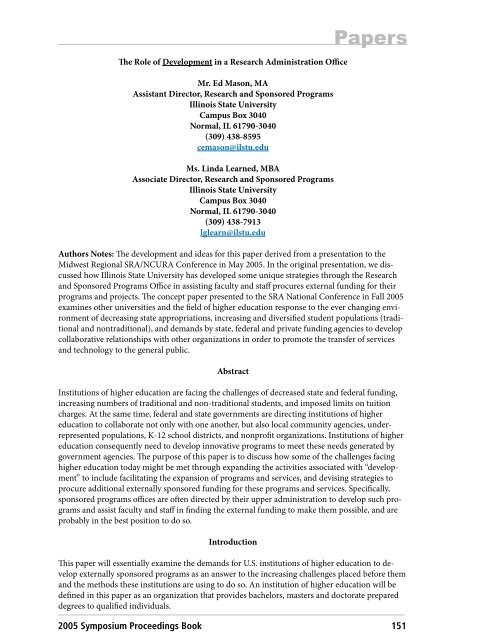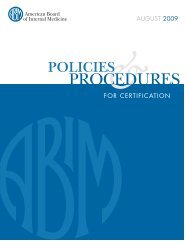The SRA Symposium - College of Medicine
The SRA Symposium - College of Medicine
The SRA Symposium - College of Medicine
You also want an ePaper? Increase the reach of your titles
YUMPU automatically turns print PDFs into web optimized ePapers that Google loves.
<strong>The</strong> Role <strong>of</strong> Development in a Research Administration Office<br />
Mr. Ed Mason, MA<br />
Assistant Director, Research and Sponsored Programs<br />
Illinois State University<br />
Campus Box 3040<br />
Normal, IL 61790-3040<br />
(309) 438-8595<br />
cemason@ilstu.edu<br />
Ms. Linda Learned, MBA<br />
Associate Director, Research and Sponsored Programs<br />
Illinois State University<br />
Campus Box 3040<br />
Normal, IL 61790-3040<br />
(309) 438-7913<br />
lglearn@ilstu.edu<br />
Authors Notes: <strong>The</strong> development and ideas for this paper derived from a presentation to the<br />
Midwest Regional <strong>SRA</strong>/NCURA Conference in May 2005. In the original presentation, we discussed<br />
how Illinois State University has developed some unique strategies through the Research<br />
and Sponsored Programs Office in assisting faculty and staff procures external funding for their<br />
programs and projects. <strong>The</strong> concept paper presented to the <strong>SRA</strong> National Conference in Fall 2005<br />
examines other universities and the field <strong>of</strong> higher education response to the ever changing environment<br />
<strong>of</strong> decreasing state appropriations, increasing and diversified student populations (traditional<br />
and nontraditional), and demands by state, federal and private funding agencies to develop<br />
collaborative relationships with other organizations in order to promote the transfer <strong>of</strong> services<br />
and technology to the general public.<br />
Abstract<br />
Institutions <strong>of</strong> higher education are facing the challenges <strong>of</strong> decreased state and federal funding,<br />
increasing numbers <strong>of</strong> traditional and non-traditional students, and imposed limits on tuition<br />
charges. At the same time, federal and state governments are directing institutions <strong>of</strong> higher<br />
education to collaborate not only with one another, but also local community agencies, underrepresented<br />
populations, K-12 school districts, and nonpr<strong>of</strong>it organizations. Institutions <strong>of</strong> higher<br />
education consequently need to develop innovative programs to meet these needs generated by<br />
government agencies. <strong>The</strong> purpose <strong>of</strong> this paper is to discuss how some <strong>of</strong> the challenges facing<br />
higher education today might be met through expanding the activities associated with “development”<br />
to include facilitating the expansion <strong>of</strong> programs and services, and devising strategies to<br />
procure additional externally sponsored funding for these programs and services. Specifically,<br />
sponsored programs <strong>of</strong>fices are <strong>of</strong>ten directed by their upper administration to develop such programs<br />
and assist faculty and staff in finding the external funding to make them possible, and are<br />
probably in the best position to do so.<br />
Introduction<br />
Papers<br />
This paper will essentially examine the demands for U.S. institutions <strong>of</strong> higher education to develop<br />
externally sponsored programs as an answer to the increasing challenges placed before them<br />
and the methods these institutions are using to do so. An institution <strong>of</strong> higher education will be<br />
defined in this paper as an organization that provides bachelors, masters and doctorate prepared<br />
degrees to qualified individuals.<br />
2005 <strong>Symposium</strong> Proceedings Book 151

















